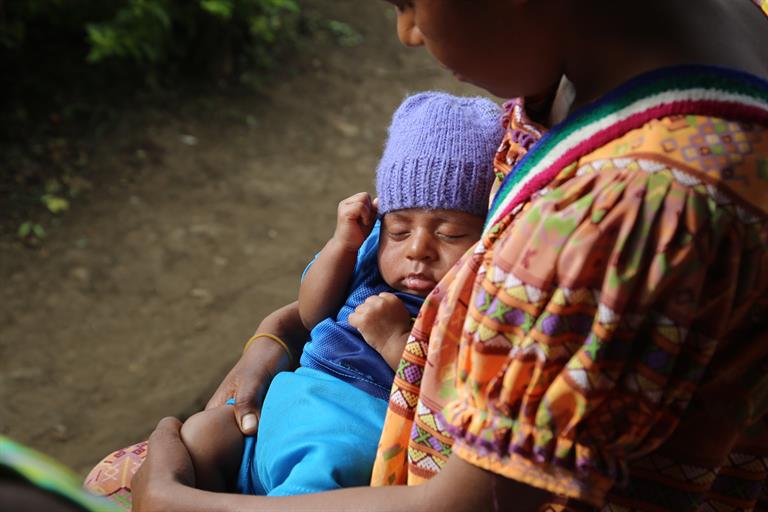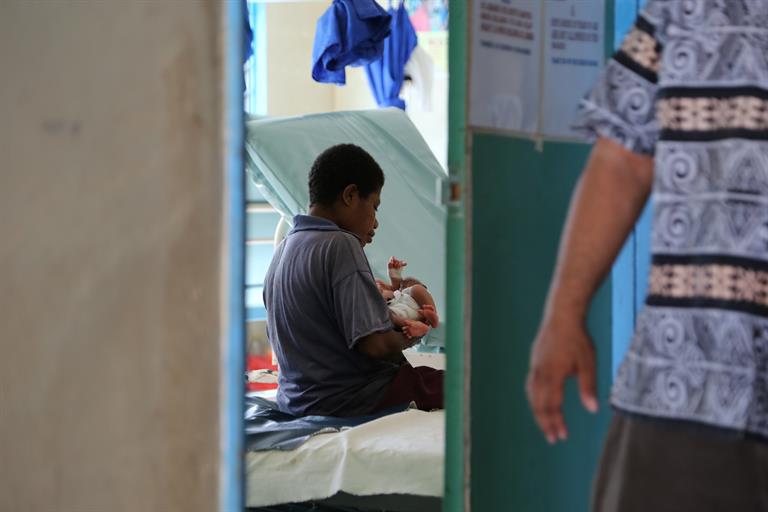
For every 1000 births in Papua New Guinea, as many as 9 mothers and 24 newborn babies die. The country has the highest rate of maternal and newborn mortality in WHO’s Western Pacific Region.
“This situation is unacceptable. No woman should die to give life. And every baby born is a life we should fight to save,” says the Honorable Sir Dr Puka Temu, Minister for Health and HIV/AIDS of Papua New Guinea. “Papua New Guinea’s very high maternal mortality rate represents a national emergency.”
These deaths are largely the result of preventable or treatable conditions, such as haemorrhages, infections and pre-eclampsia or eclampsia – a condition characterized by convulsions caused by high blood pressure in pregnant women. Likewise, the deaths of newborn infants are often due to a lack of quality care around delivery, leading to infection and asphyxia.
“Protecting and promoting the health and rights of women is a responsibility I take extremely seriously – and one of my highest priorities,” says Dr Takeshi Kasai, WHO Regional Director for the Western Pacific.
Dr Kasai is visiting Papua New Guinea in the first days of his term “to reinforce my commitment to the welfare of every woman and child in this country, and to assure the Government of WHO’s strong support to address this crisis.”
In December 2018, Sir Dr. Temu convened the ministerial-level Maternal and Newborn Health Task Force to advise the Government on the best way to address high rates of maternal and newborn deaths. The task force’s analysis of the situation is being released today. The final report containing recommendations will be released in March.
Women avoid facilities
Skilled birth attendants — doctors, midwives and nurses — are essential for early identification and management of problems for both mother and baby. In the 1990s, more than half of the births in Papua New Guinea were conducted by skilled birth attendants; however, the rate has declined to less than 40% in recent years.
Concerns about quality of care are a major reason why pregnant women avoid health facilities, according to the task force’s findings. Instead, women opt for the risks of an unattended birth at home. Women reported that many health facilities often did not have staff or only had male staff, whom women said they did not trust to provide good birth care. This perception is borne out by that data: Papua New Guinea has the lowest rates of skilled birth attendants in the Western Pacific, with an estimated 6000 more skilled birth attendants needed to meet the global standard.
In many cases, facilities lack basics such as running water and electricity needed to ensure a safe and sanitary environment for giving birth. Many facilities did not have refrigerators for vaccines or adequate stock of essential drugs and supplies to treat common conditions.
For example, only 16% of facilities surveyed had syphilis test kits. The kits detect the dangerous but treatable bacteria that can cause stillbirths and life-threatening birth defects. Only one in two facilities had appropriately stored oxytocin, which is essential to prevent bleeding after childbirth.
More than a third of the oral poliovirus vaccine on hand was unusable due to heat exposure, the task force found.
The task force heard harrowing stories of patients dying at health facilities while waiting for staff to arrive. A woman with haemorrhage died of shock at a health centre that had no intravenous fluids, an essential intervention to stabilize people whose blood pressure drops from loss of blood (or other fluids). The task force, in fact, found that many staff at facilities did not know how to use essential medicines to treat haemorrhage or pre-eclampsia.
Cost is a significant issue for many women, including the cost of transport and payments for services and supplies that should be free. Many women reported waiting for long hours only to be sent home and told to return the next day, further increasing travel costs.
Fear, shame, violence and disempowerment discourage women from seeking care
Husbands, partners and families play a crucial role in the decision to seek care during pregnancy or childbirth.
Many of the women interviewed said they were reluctant to seek care because of fear, shame and risk of violence. Some women recounted stories of being scolded by health workers for having too many children or not having proper clothes for the baby.
Family members often told the stories of those who could no longer speak for themselves.
One pregnant woman feared her physically abusive husband’s reaction to her pregnancy so much that that she escaped to her sister’s house to get an unsafe abortion, which left her dead from blood loss.
Other women feared asking for money to go to a health facility. A father of one woman refused to let her go to a facility for three days. She ended up dying from a treatable condition known as retained placenta.
Task force members were astonished by how family members could tell their stories of death with such a sense of resignation. They had come to consider death in pregnancy and childbirth as a regular occurrence about which nothing could be done.
Underlying these problems is a lack of timely and reliable routine health data. In six provinces, for example, the task force found that less than 40% of maternal deaths in facilities were reported. The actual figures are much worse, because deaths at home almost never get recorded. Without data, planning and monitoring progress on child and maternal health is difficult.
Making a difference for women
While the overall findings of the task force are cause for deep concern, some positive trends were observed.
For example, the quality of midwifery training in Papua New Guinea has improved dramatically since 2009, and the number of practising midwives has almost tripled, which is helping to make inroads on addressing the serious staff shortage. Provincial staff interviewed by the task force also expressed a strong desire and willingness to improve the situation.
The Minister for Health says he plans to use the task force findings to develop a medium- and long-term action plan for improving maternal and newborn health that is simple, specific and actionable.
“I consider it my personal mission to remedy this horrific situation,” Sir Dr. Temu says. “I will do everything in my power to unite government, the parliament, provincial health authorities, health providers and development partners to fix this.”
“Two thousand mothers dying every year while giving birth is two thousand too many,” adds Dr Kasai. “WHO stands with the Honorable Sir Dr Puka Temu and the Government of Papua New Guinea in their efforts to address this unacceptable situation. The lives of women and babies across Papua New Guinea are depending on it.”

Notes to editors:
The Maternal and Newborn Health Task Force
The Maternal and Newborn Health Task Force is chaired by Dr Paison Dakulula, Deputy Secretary, National Health Standard Services at the National Department of Health.
The task force includes ministerial staff, WHO and other United Nations partners, provincial representatives, academics, research institutes, professional societies, development partners and civil society organizations.
The rapid assessment was conducted using available literature (76 documents), facility assessments (40), reviews of maternal death records (66) and interviews with families of mothers who died (45).
For further information, please contact:
Dr. Edward Waramin, Acting Manager,
Family Health Services Branch,
Public Health Division, NDOH
Phone: +675 301 3706 Mobile: +675 76065817
Email: edwaramin@yahoo.com.au
Jacinta Francis, Technical Officer,
Family Health Services Branch,
Public Health Division, NDOH
Phone: +675 301 3706 Mobile: +675 70543199
Email: jacintapfrancis@gmail.com
Renagi Taukarai
Communications Officer
WHO Papua New Guinea
Phone: +675 325 7828 Mobile: +675 75437337
Email: taukarair@who.int
